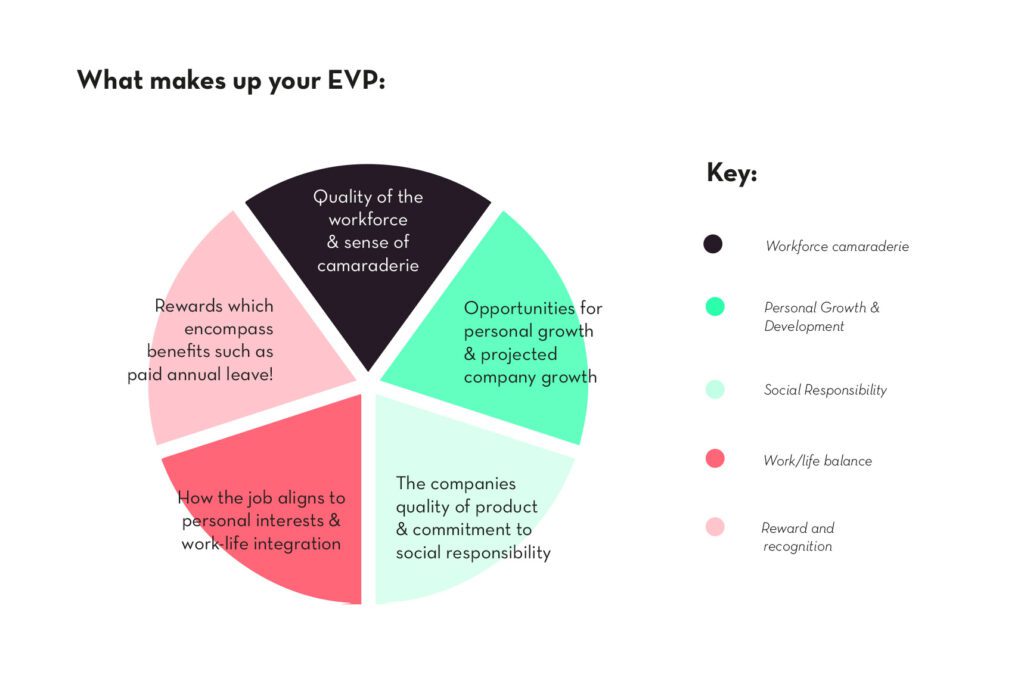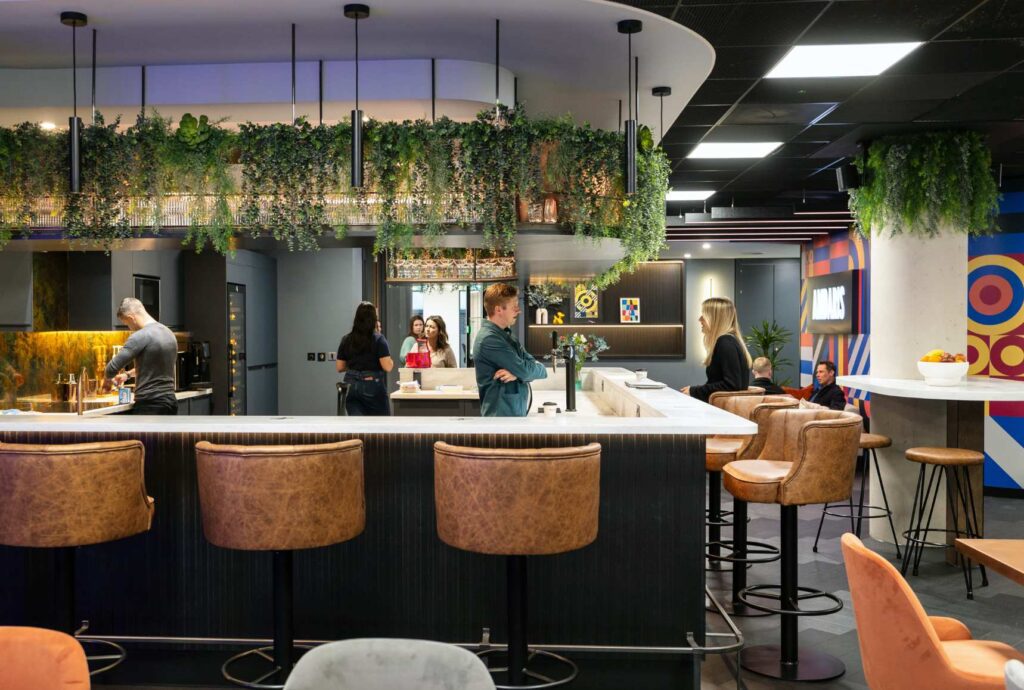Using your Employee Value Proposition to attract top talent
A business’s Employee Value Proposition (EVP) is one of the fundamentals to success. It influences recruitment, culture, reputation and the all important work-life balance. This article explores the relationship between the workplace and a company’s EVP, and why that EVP is so influential.
What is an Employee Value Proposition?
An EVP is an internal-facing snapshot of a business’s company culture, spanning their unique mix of benefits including pay, bonuses, workplace, culture, training and career prospects. It’s made up of all the added extras that you may get as an employee of that company. There’s no denying that salary is one of the key motivators when choosing a job, however we are starting to see growing value placed on other factors too. Only 44% of millennials (born 1981-1996) feel that salary is important, second to career development. Flexibility, culture, hybrid models and recognition are some of the other main influences regarding recruitment and motivation to work. A 2020 Joblist survey found that half of employees care more about flexibility than salary, and Glassdoor found that 56% of respondents prioritise workplace culture over salary.

Gartner defined EVP under five core attributes:
- Opportunities for personal growth, and projected company growth
- The quality of the company’s product or service
- Commitment to social responsibility
- How the role aligns to personal interests and supports the work-life balance
- Rewards and recognition
A strong and accurate Employee Value Proposition is effective in reducing employee churn rate, saving time, money and resources. The Harvard Business Review found that companies with a strong EVP had a 69% lower turnover rate compared to companies with a weak one. An EVP is the differentiating factor between one company and its competitor, and is the missing piece of the puzzle for businesses who struggle to attract and retain talent.
What are the different aspects of Employee Value Proposition?
People are a company’s most valuable resources, influencing external reputation and employee brand. When employees have a positive relationship with the workplace and their experience in their role, they are likely to discuss this within their inner circles and reviews. Employees read an average of 6 reviews of a company before forming an opinion about them. Your EVP is a way to show you’ve prioritised what really matters to your people and built a workplace that’s aligned to their needs.
Personal growth and development
Will the employee be pushed to new limits? Can they see themselves developing new skills and passions, and are they supported by the business to do so? Perhaps the business offers academic courses, skills workshops or presentations. Are the employees given autonomy over their work, and freedom to experiment with new things?
Product or service delivery
Does the company’s product or service align with the employees views, morals and values? Is it of a high quality, something they feel confident to promote? Is it as sustainable as possible, and are they truthful, authentic and fair in their practices?
Social responsibility
Does the business take advantage of its influence and position to give back, and encourage charitable initiatives such as paid volunteer work, charity events and fundraising? Perhaps they support eco-friendly operations, promoting sustainable practices and organisations.
Work/life balance
Is the employee able to have true breaks from their work? Do they find that their work infiltrates into their free time? Maybe the business has an out-of-hours etiquette policy, or takes action to reduce presenteeism and leavism.
Reward and recognition
Is the employee recognised for their work, and given credit not only externally but also within the business? Are there regular opportunities for rewarding great performance? Consider using a recognition platform, such as HiBob or Mo for ease of internal communication.
How can the workplace represent a company’s EVP?
Some companies (including ourselves) have a physical copy of their EVP in the form of an onboarding booklet or similar. Bristol-based brand agency Mr B and Friends dubbed theirs ‘The Friends Pact’, encapsulating all the career benefits that their employees receive in a book. Whether physical or virtual, an EVP can often be linked back to the workplace.
A company’s culture and values can manifest in their work environment in a plethora of ways. For example, a business who boasts a collaborative culture may have a broken-plan layout to encourage teamwork and communication amongst the team. Similarly, an innovative business is likely to show creativity and flexibility in their workspace, supporting experimenting and problem-solving. Sustainability can also be represented by the office, through the use of eco-friendly materials and practices.
A ‘destination workplace’, where people feel enriched and supported can also represent Employee Value Proposition. If an EVP claims to value and invest in its people, the workplace should align with that. Amenities such as fitness facilities, healthy food and wellness programmes are frequent features of destination workplaces, alongside spaces that foster community and company culture. Engaging breakout spaces and social areas are perfect examples of this.
Corporate Social Responsibility (CSR) is important to all modern businesses, and the workplace is one of the ways you can incorporate that into your EVP. Using sustainable materials and practices, taking effort to reduce your carbon footprint by offering active travel incentives and supporting eco-friendly operations are some great ways to do so. Perhaps you could source your office essentials from a local food supplier who delivers by bike or on foot, and recycles empty containers.
Philanthropic initiatives such as paid volunteering and company-wide charity events can be woven into company culture. Here at Interaction, we fundraise for our ‘charity of the year’ and each Actioneer receives two commitment days of volunteering per year. Read more about our brilliant culture on our blog.
With hybrid and remote working models increasingly popular amongst businesses, there’s nothing more important than making sure your staff can switch off at the end of the day to avoid losing their work/life balance. Here are some of the things you can do to encourage a healthy work-life balance.
- Include sociable spaces in the office where social events can be held after work, allowing the team to unwind and build relationships
- Implement flexible hours to allow employees to make their job work for them, around their other commitments and personal working styles
- Consider hybrid integration in the office for the ease of both office and remote workers to work together easily
- Offer active travel facilities to encourage sustainable and healthy travel, such as bike storage and showers
- Equip the workplace with enough lockers to help people manage their work-life balance and keep their personal time free from work
- Include a gym, fitness suite or yoga studio in the workplace to encourage healthy breaks from work and lifestyle improvements

The role of a company’s EVP in recruitment and talent acquisition
You may be surprised how influential your EVP can be when recruiting; Two thirds of employees research a company before deciding whether to apply, with 61% of people prioritising work-life balance and wellbeing in their search.
Does a poor EVP increase recruitment costs?
High-quality candidates can be hard to attract when a business’s EVP is weak, not to mention the fact that employee retention can also be a struggle for this reason. When faced with competitive job offers, these sought after candidates will often have the flexibility to allow things like EVP to shape their ultimate decision. This will drive recruitment costs up, not to mention time and resources. Employer branding can also suffer from a poor EVP, taking a toll on talent attraction, leaving the employer with no choice but to increase recruitment and advertising efforts.
How does EVP affect employer branding?
Intrinsically linked, EVP and employer brand form the foundations of a business’s reputation. While your EVP communicates to employees what they can hope to receive as part of your team, your employer brand refers to how you present yourself externally as an employer. A strong EVP can boost employer branding by communicating the unique value proposition of the company, setting it apart from potential competition. It’s no surprise then that recruitment efforts can improve due to the positive perception of the business, leading to a strong employer brand.
How can EVP be incorporated into recruitment materials?
As an employer, if your EVP isn’t something you want to show off when attracting new talent, it’s probably not good enough. Your EVP could be the deciding factor between your company and the next, and it can make the difference between top talent and the next best thing. Your recruitment materials should highlight the unique experience that candidates would receive as an employee, such as the company culture, values, work environment, experience and opportunities for development. It doesn’t matter how this is presented to the candidate, the important thing is that you want to shout about it.
Is EVP an important part of the candidate experience?
A candidate’s decision to accept a job offer is increasingly influenced by EVP, as it shapes their perceptions of the company and how their working days will look. More and more, employees are favouring work-life balance over salary, a clear indicator of changing employee expectations and needs.
How many candidates accept job offers based on EVP?
According to Gartner, 65% of candidates have reported discontinuing a hiring process due to the company’s unattractive EVP. While it’s impossible to determine how many people accept job offers based solely on EVP, it’s clearly a significant consideration, especially now that people are placing more value on workplace culture and employee experience. After all, 67% of workers believe that culture is more important than strategy or operations for business outcomes.
Can a positive EVP improve employee referrals?
There’s nothing better than a positive atmosphere at work. Employees who recount their good experiences with their inner circle help to improve the reputation of the business, as well as by corporate networking and social media activity. Over time, this improved reputation will improve employee referrals.
Which companies are using the workplace to enhance their EVP?
All great companies are using the workplace to enhance their EVP, including Google, Salesforce and Airbnb. Here at Interaction, we too have created countless innovative and unique workspaces such as Immersive Labs, which includes a games room, scooter track and serene yoga studio. We partnered with some of the nation’s top law firms to create the ‘Law of Attraction’ whitepaper, where they share how they are using the workplace to enhance their employee value proposition. Check that out here.



Now you know why you need a bulletproof EVP, it’s time you got the wheels in motion and started seeing it come to fruition for both your business and your employees. Why not learn more about workplace strategy, check out our case studies, read more articles from us, or feel free to give us a call with any questions on 01225 485 600.



